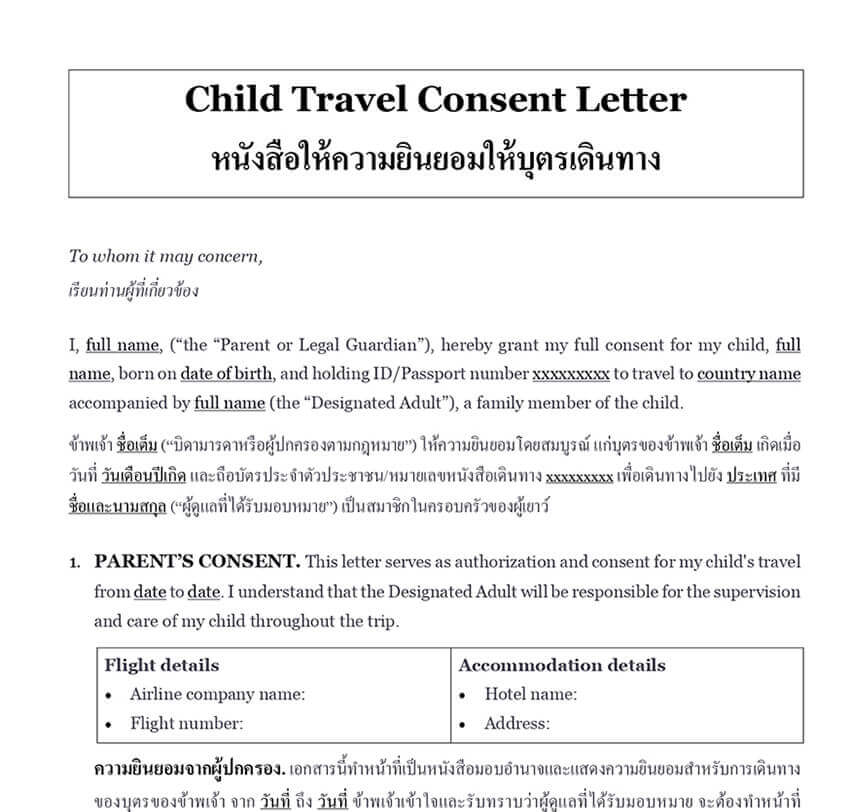Ready to use legal template
Drafted by experienced lawyers
Certified Thai-English translation
Ready to use legal template
Drafted by lawyers
Translated in Thai-English
Home › Family Law › Child Travel Consent
Learn more about Child Travel Consent Letter in Thailand
A Child Travel Consent Letter is a vital document for parents or guardians allowing a minor to travel internationally or within Thailand. This letter provides official authorization for the child to travel accompanied by another adult or alone. In Thailand, ensuring proper documentation is crucial to comply with legal requirements and ensure the child’s safety during travel. At Themis Partner, we offer a convenient solution with our expertly crafted Child Travel Consent Letter template. Designed by experienced lawyers in full compliance with Thai laws, our editable template streamlines the process, making it effortless for parents and guardians to grant consent while adhering to legal standards.
Table of contents
-
What is a Child Consent Letter?
-
Who should provide consent to the Child?
-
What does a Child Consent Letter include?
-
Is a Child Consent Letter required for minors traveling alone?
-
Shall a Child Consent Letter be notarized or certified?
-
Are there requirements for school-related activities?
-
What to do if traveling abroad with a child without parents?
What is a Child Consent Letter?
A Child Travel Consent Letter in Thailand is a legal document that provides authorization from a parent or legal guardian for a minor child to travel internationally or within the country. It is used to grant permission for the child to travel either alone or in the company of another adult who is not the child’s parent or legal guardian.
This letter serves as a formal declaration of consent, affirming that the child has the permission of their parent or guardian to embark on the specified journey. It is often required by immigration authorities, airlines, and other relevant parties to ensure the child’s safety and comply with legal regulations.
A Child Consent Letter is typically used in the following situations:
1. International Travel
When a minor is traveling abroad without one or both parents, a Child Consent Letter is often required by immigration authorities in both the departing and arriving countries. This letter establishes that the child has permission to leave the country and travel internationally.
2. Domestic Travel
Even for travel within Thailand, a Child Consent Letter might be requested when a minor is traveling alone or with someone other than their parent or legal guardian. This helps prevent potential concerns at security checkpoints and ensures the child’s well-being during the journey.
3. School or Group Trips
Educational institutions and organizations arranging trips for students or minors might request a Child Consent Letter to ensure proper authorization for travel.
4. Medical Treatment Abroad
In cases where a child needs medical treatment abroad and is accompanied by a relative or guardian, a Child Consent Letter can be required to provide consent for medical procedures.
Who should provide consent to the Child?
Travel consent for a child should be provided by their parent or legal guardian. In most cases, the parent or legal guardian who has custody of the child and the legal authority to make decisions on their behalf should provide the travel consent. The consent should be given in writing through a Child Travel Consent Letter.
If both parents have legal custody of the child, it’s recommended that both parents provide their consent for the child’s travel, even if only one parent is accompanying the child. This can help prevent any complications or issues that might arise at immigration or border control.
In situations where one parent has sole custody or the other parent’s rights are restricted, the parent with legal custody is typically the one who should provide the travel consent.
It’s important to note that the specific requirements for travel consent can vary based on the country’s laws and regulations, as well as the policies of airlines and immigration authorities.
What does a Child Consent Letter include?
1. Child’s Information: Full name, date of birth and Passport or identification details of the child.
2. Parent or Guardian Information: Full name of the parent or legal guardian providing consent relationship to the child (e.g., mother, father, legal guardian) and contact information of the parent or legal guardian.
3. Travel Details: Destination country or countries, departure and return dates and purpose of travel (e.g., vacation, school trip, medical treatment)
4. Accompanying Adult (if applicable): Full name of the accompanying adult, Relationship to the child (e.g., aunt, uncle, family friend) and contact information of the accompanying adult (address, phone number, email)
5. Authorization and Consent: A clear statement granting permission for the child to travel internationally or domestically and explicit consent for the child to travel with the specified accompanying adult, if applicable.
6. Duration of Consent: Specify if the consent is valid for a single trip or for a specific period of time.
7. Additional Information: Any other relevant information, such as flight details, accommodation arrangements and emergency contact numbers.
8. Signature and Date: Signature of the parent or legal guardian providing consent and date of signing the letter.
Is a Child Consent Letter required for minors traveling alone?
Yes, a Child Consent Letter is often required for minors traveling alone, especially for international travel. When a minor is traveling without a parent or legal guardian, many countries and airlines require a Child Consent Letter to provide formal authorization from the parent or guardian for the child to embark on the journey. The Child Consent Letter serves as proof that the child has permission to travel without being accompanied by a parent or legal guardian. It helps prevent any confusion or concerns at immigration checkpoints and border control, ensuring the child’s safety and compliance with travel regulations.
Shall a Child Consent Letter be notarized or certified?
Whether a Child Consent Letter needs to be notarized or certified depends on the requirements of the destination country, the policies of airlines, and the specific circumstances of the travel. In many cases, having the Child Consent Letter notarized or certified can provide an additional layer of authenticity and may be recommended, especially for international travel.
Here are some factors to consider:
| ➤ Destination Country Requirements: Some countries have specific requirements for documentation when minors are traveling alone or with someone other than their parents. Notarization or certification of the Child Consent Letter might be a requirement in certain countries. |
| ➤ Airline Policies: Airlines may have their own policies regarding travel consent for minors. Some airlines may request a notarized or certified Child Consent Letter to ensure that the document is genuine and that the child has proper authorization to travel. |
| ➤ Immigration Authorities: Immigration authorities in the destination country may request notarization or certification as part of their immigration and border control procedures. |
| ➤ Safety and Verification: Notarization or certification can help verify the authenticity of the consent letter and the identity of the person providing consent. This can be particularly important for the child's safety and to prevent potential cases of child abduction. |
| ➤ Peace of Mind: Having a notarized or certified Child Consent Letter can provide peace of mind to parents, guardians, and the child, as it adds an official and legal confirmation of the consent. |




